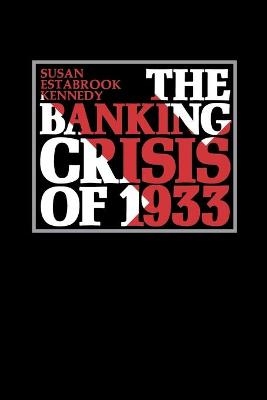
The Banking Crisis of 1933
Seiten
2014
The University Press of Kentucky (Verlag)
978-0-8131-5291-2 (ISBN)
The University Press of Kentucky (Verlag)
978-0-8131-5291-2 (ISBN)
On March 6, 1933, Franklin D. Roosevelt, less than forty-eight hours after becoming president, ordered the suspension of all banking facilities in the United States. How the nation had reached such a desperate situation and how it responded to the banking “holiday” are examined in this book, the first full-length study of the crisis.
On March 6, 1933, Franklin D. Roosevelt, less than forty-eight hours after becoming president, ordered the suspension of all banking facilities in the United States. How the nation had reached such a desperate situation and how it responded to the banking "holiday" are examined in this book, the first full-length study of the crisis.
Although the 1920s had witnessed a wave of bank failures, the situation worsened after the 1929 stock market crash, and by the winter of 1932-1933, complete banking collapse threatened much of the nation. President Hoover's stopgap measures proved totally inadequate, the author shows, and by March 4, the day of Roosevelt's inauguration, thirty-four states had declared banking moratoriums. Of special interest in this study is Ms. Kennedy's examination of relations between Herbert Hoover and Franklin D. Roosevelt.
On March 6, 1933, Franklin D. Roosevelt, less than forty-eight hours after becoming president, ordered the suspension of all banking facilities in the United States. How the nation had reached such a desperate situation and how it responded to the banking "holiday" are examined in this book, the first full-length study of the crisis.
Although the 1920s had witnessed a wave of bank failures, the situation worsened after the 1929 stock market crash, and by the winter of 1932-1933, complete banking collapse threatened much of the nation. President Hoover's stopgap measures proved totally inadequate, the author shows, and by March 4, the day of Roosevelt's inauguration, thirty-four states had declared banking moratoriums. Of special interest in this study is Ms. Kennedy's examination of relations between Herbert Hoover and Franklin D. Roosevelt.
Susan Estabrook Kennedy is assistant professor of history at Temple University in Philadelphia.
| Erscheint lt. Verlag | 15.7.2014 |
|---|---|
| Verlagsort | Lexington |
| Sprache | englisch |
| Maße | 152 x 229 mm |
| Themenwelt | Geisteswissenschaften ► Geschichte ► Regional- / Ländergeschichte |
| Geschichte ► Teilgebiete der Geschichte ► Wirtschaftsgeschichte | |
| Sozialwissenschaften ► Politik / Verwaltung ► Politische Theorie | |
| Sozialwissenschaften ► Politik / Verwaltung ► Staat / Verwaltung | |
| Wirtschaft ► Betriebswirtschaft / Management ► Finanzierung | |
| ISBN-10 | 0-8131-5291-7 / 0813152917 |
| ISBN-13 | 978-0-8131-5291-2 / 9780813152912 |
| Zustand | Neuware |
| Haben Sie eine Frage zum Produkt? |
Mehr entdecken
aus dem Bereich
aus dem Bereich
die Ukraine, Polen und der Irrweg in der russischen Geschichte
Buch | Hardcover (2023)
C.H.Beck (Verlag)
28,00 €
eine Globalgeschichte des Kapitalismus
Buch | Hardcover (2023)
C.H.Beck (Verlag)
38,00 €


